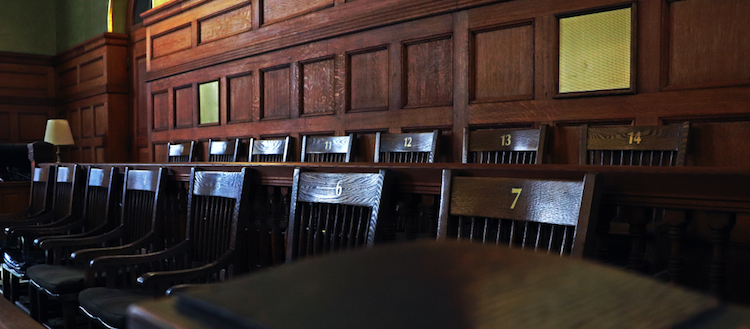Evidence of jury racial bias in civil trial requires hearing, 6th Circuit says, citing 'crackhead' assumption

Image from Shutterstock.com.
A federal trial court must hold a hearing to examine potential jury bias after one woman said jurors considered the Black plaintiff to be "a crackhead" and referred to his lawyers as the "Cosby Show," a federal appeals court has ruled.
In an April 6 decision, the 6th U.S. Circuit Court of Appeals at Cincinnati said the no-impeachment rule, which generally bars evidence of jury deliberations, does not apply in cases of racial bias, even in civil cases.
A Black juror, mistaken for a Latino woman by white jurors, had said she didn’t think the plaintiff got a fair trial because of “blatant racial stereotyping.” She said jurors discredited the plaintiff’s testimony and thought his calm demeanor must be because he was drinking or taking dope during trial breaks.
Jurors also referred to the plaintiff’s Black lawyer and his trial team as the “Cosby Show”—a reference to the 1984 TV show The Cosby Show—the Black juror said in her affidavit.
When the Black juror told colleagues that their job was to decide the plaintiff’s excessive force claim, the jurors “kept saying he just wants money; he’s a crackhead; he’s an alcoholic; look at his wife, she’s nodding off; she looks like she’s on heroin,” the Black juror said.
The jury’s “wholly unsupported belief” that the plaintiff and his partner were hard drug users “demonstrates overt racial bias,” the 6th Circuit said in an opinion by Judge Eric Clay. The “Cosby Show” reference “only bolsters this conclusion,” Clay said.
The 6th Circuit opinion noted the 2017 U.S. Supreme Court decision Pena-Rodriguez v. Colorado, in which a juror in a criminal prosecution for sexual assault said that, in his experience, Mexican men think they can do whatever they want with women. Citing the Sixth Amendment right to a jury trial in criminal cases, the Supreme Court said courts may investigate evidence of racial bias that interferes with the jury trial guarantee.
Although Pena-Rodriguez was a criminal case based on the Sixth Amendment, the reasoning also applies to civil cases under the 14th Amendment’s guarantee of equal protection of the law, the 6th Circuit said.
“Because Pena-Rodriguez held that the no-impeachment rule has no place when it comes to evidence of racial bias, and considering the Supreme Court’s precedent establishing the need to eliminate racial discrimination from the civil courtroom, we hold that the no-impeachment rule must give way to evidence of racial bias in civil cases,” Clay wrote.
The appeals court ruled in a suit by John Harden, a Black man who alleged that a Heritage Creek, Kentucky, police officer used excessive force when he arrested Harden at a Thorntons convenience store in Louisville, Kentucky. Harden had gone to the store to buy beer, but the clerk refused to serve him because she thought he already had too much to drink. After Harden protested, an officer moonlighting as a security guard intervened and told Harden to leave. Harden followed his instructions but returned to the store to buy chips.
At that point, the officer told Harden that he was going to jail unless he left. Harden told the officer to take him to jail. At that point, the officer pinned him to the counter and then slammed him to the ground, Harden had alleged in his lawsuit.
Clay is an appointee of former President Bill Clinton. Judge Richard Suhrheinrich, an appointee of former President Ronald Reagan, said in a partial dissent he does not think the alleged juror statements show the kind of serious, overt bias needed to obtain a hearing.
Hat tip to Bloomberg Law, which had coverage of the decision.



